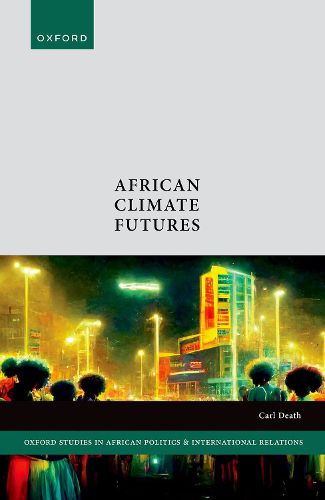Readings Newsletter
Become a Readings Member to make your shopping experience even easier.
Sign in or sign up for free!
You’re not far away from qualifying for FREE standard shipping within Australia
You’ve qualified for FREE standard shipping within Australia
The cart is loading…






African Climate Futures shows how climate-changed futures are imagined in Africa and by Africans, and how these future visions shape political debates and struggles in the present. Scientific climate scenarios forecast bleak futures, with increased droughts, floods, lethal heatwaves, sea level rises, declining crop yields, and greater exposure to vector-borne diseases. Yet, African climate futures could also encompass energy transitions and socio-economic revolutions, transformed political agency and human subjectivities, and radically reparative more-than-human climate politics.
At the heart of the book is an original and interdisciplinary approach. It studies official climate policy strategies and fictional texts side-by-side, as ecopolitical imaginaries that envision low-carbon, climate-changed futures, and narrate pathways from 'here' to 'there'. It discusses net zero strategies from Ethiopia, The Gambia, Nigeria, South Africa, and Zimbabwe and draws on postcolonial, feminist, and queer theory, arguing that Africanfuturist climate fiction can inspire more radical, reparative, more-than-human ecopolitical imaginaries. These stories can help us to understand the debts we all owe, imagine what reparations might entail, and explore the contours of living convivially alongside more-than-human others in heterotopian, climate-changed futures.
Stories can help explore how we might feel in climate-changed futures and can help us to narrate a path through them. This book uses Africanfuturist climate fiction to inspire new ways of challenging and enriching theoretical debates in global climate change politics, including how we understand the places, temporalities, ecologies, and politics of climate futures. If we want to survive to tell new stories in liveable futures then we need to urgently and radically transform carboniferous capitalism.
Oxford Studies in African Politics and International Relations is a series for scholars and students working on African politics and International Relations and related disciplines. Volumes concentrate on contemporary developments in African political science, political economy, and International Relations, such as electoral politics, democratization, decentralization, gender and political representation, the political impact of natural resources, the dynamics and consequences of conflict, comparative political thought, and the nature of the continent's engagement with the East and West. Comparative and mixed methods work is particularly encouraged. Case studies are welcomed but should demonstrate the broader theoretical and empirical implications of the study and its wider relevance to contemporary debates. The focus of the series is on sub-Saharan Africa, although proposals that explain how the region engages with North Africa and other parts of the world are of interest.
Series Editors: Nic Cheeseman (University of Birmingham), Peace Medie (University of Bristol), and Ricardo Soares de Oliveira (University of Oxford).
$9.00 standard shipping within Australia
FREE standard shipping within Australia for orders over $100.00
Express & International shipping calculated at checkout
African Climate Futures shows how climate-changed futures are imagined in Africa and by Africans, and how these future visions shape political debates and struggles in the present. Scientific climate scenarios forecast bleak futures, with increased droughts, floods, lethal heatwaves, sea level rises, declining crop yields, and greater exposure to vector-borne diseases. Yet, African climate futures could also encompass energy transitions and socio-economic revolutions, transformed political agency and human subjectivities, and radically reparative more-than-human climate politics.
At the heart of the book is an original and interdisciplinary approach. It studies official climate policy strategies and fictional texts side-by-side, as ecopolitical imaginaries that envision low-carbon, climate-changed futures, and narrate pathways from 'here' to 'there'. It discusses net zero strategies from Ethiopia, The Gambia, Nigeria, South Africa, and Zimbabwe and draws on postcolonial, feminist, and queer theory, arguing that Africanfuturist climate fiction can inspire more radical, reparative, more-than-human ecopolitical imaginaries. These stories can help us to understand the debts we all owe, imagine what reparations might entail, and explore the contours of living convivially alongside more-than-human others in heterotopian, climate-changed futures.
Stories can help explore how we might feel in climate-changed futures and can help us to narrate a path through them. This book uses Africanfuturist climate fiction to inspire new ways of challenging and enriching theoretical debates in global climate change politics, including how we understand the places, temporalities, ecologies, and politics of climate futures. If we want to survive to tell new stories in liveable futures then we need to urgently and radically transform carboniferous capitalism.
Oxford Studies in African Politics and International Relations is a series for scholars and students working on African politics and International Relations and related disciplines. Volumes concentrate on contemporary developments in African political science, political economy, and International Relations, such as electoral politics, democratization, decentralization, gender and political representation, the political impact of natural resources, the dynamics and consequences of conflict, comparative political thought, and the nature of the continent's engagement with the East and West. Comparative and mixed methods work is particularly encouraged. Case studies are welcomed but should demonstrate the broader theoretical and empirical implications of the study and its wider relevance to contemporary debates. The focus of the series is on sub-Saharan Africa, although proposals that explain how the region engages with North Africa and other parts of the world are of interest.
Series Editors: Nic Cheeseman (University of Birmingham), Peace Medie (University of Bristol), and Ricardo Soares de Oliveira (University of Oxford).